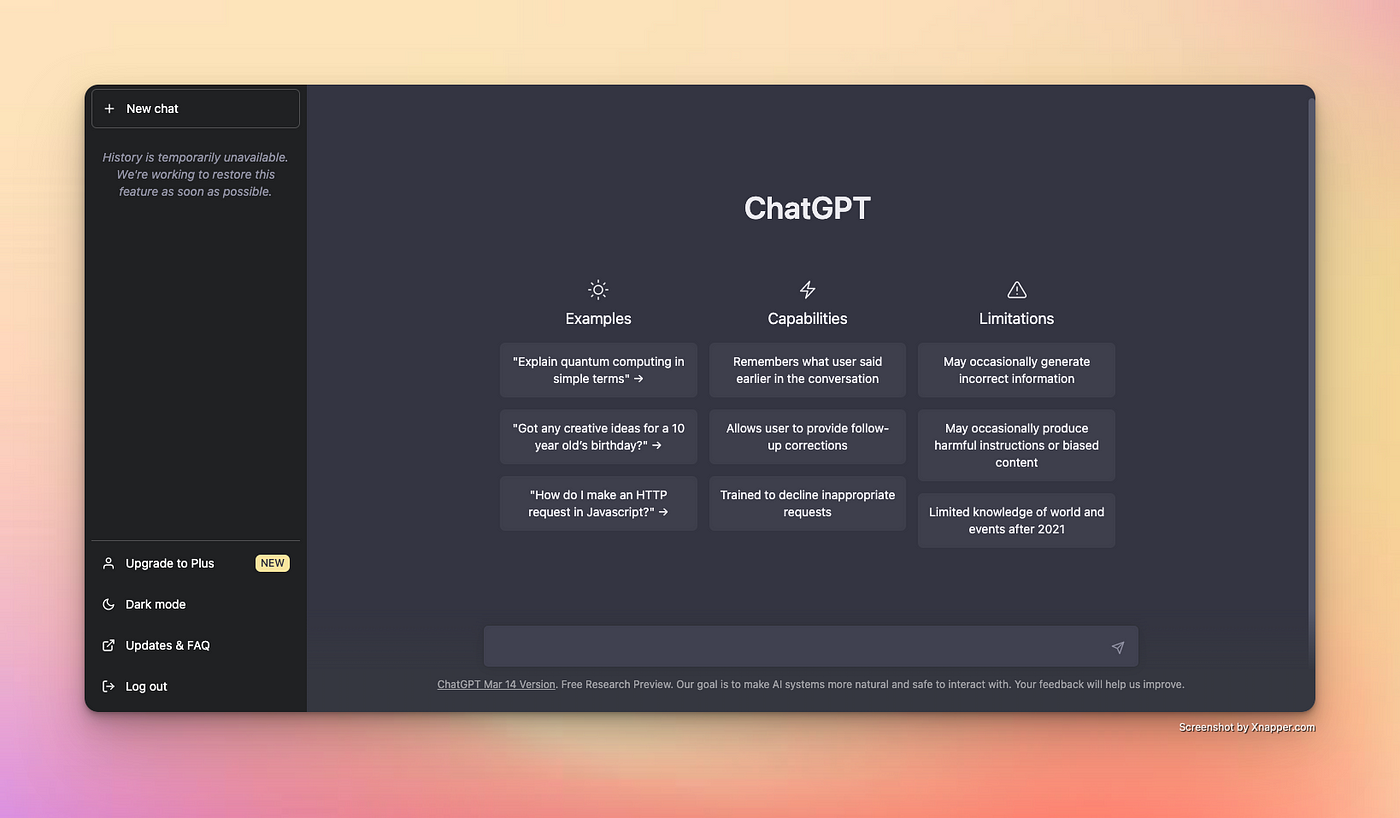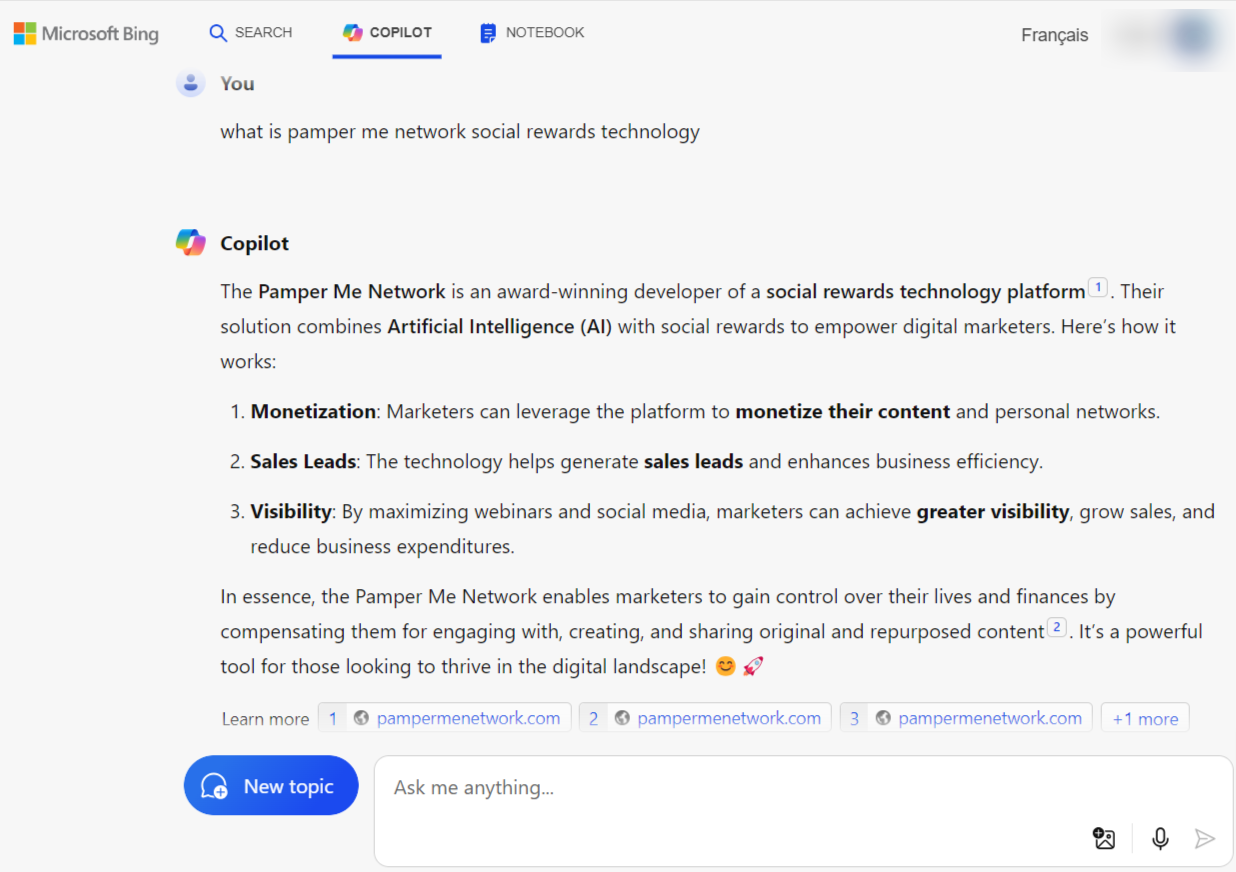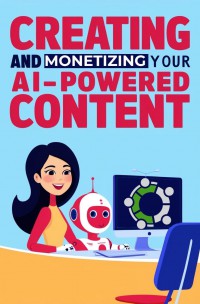MONETIZE & BOOST CONTENT
Monetizing your FREE webinars and related content has never been easier. Use our platform to list your events and onboard new affiliates as well as guests. Earn $1.00 for each new guest you onboard, share up to 70% of tipping and membership revenues and promote your webinar(s) to reach new global markets.
Drive earnings and expand reach to include listing of your webinar on upto 6,000 + event calendars, blogs and social media groups.
NINE MONETIZATION BENEFITS
- Earn $1 for each new collaborator/registration
- Share up to 70% of tipping revenues
- Share up to 12.5% of e-commerce revenues
- Share up to 50% of membership upgrades
- Share up to 30% of hosting upgrades
- Share up to 12.5% of your team's earnings
- Transform supporters into your affiliates
- Build viral fan networks
- Identify affiliates to promote your webinars
Save & Earn $10K Per Month
AI Chatbots vs. Traditional Search Engines: The Future of Online Discovery
Build CollaborateIn an era where Gen Z is spearheading a technological revolution, the landscape of online discovery is rapidly changing. Traditional search engines, once the go-to tools for finding information, are gradually being overshadowed by AI chatbots and virtual assistants. According to a report by Gartner, search engine volume could drop by 50% by 2028 as users increasingly turn to generative AI assistants like ChatGPT, BingChat, and Claude.
These AI-powered tools are transforming search from a process of keyword hunting into an interactive conversation, making it essential for businesses to adapt. As AI chatbots become more prevalent, businesses must rethink how they create and share content to ensure their visibility in this new digital environment.

This article explores the factors influencing inclusion in AI responses, where to share content to enhance discovery, and why making content available to large language models (LLMs) is crucial for success.
The Power Shift: From Search Engines to AI Assistants
Imagine asking your AI assistant for recommendations on the best kitchen countertops. If your business specializes in high-quality countertops, you'd want your brand to be part of that conversation. Unlike traditional search engines that rely on users to sift through pages of results, AI assistants provide concise, tailored responses, often from a limited set of sources. This shift in how information is accessed has significant implications for businesses aiming to maintain or increase their online visibility.
How AI Assistants Operate
AI assistants rely on large language models (LLMs) trained on vast datasets, including books, articles, social media posts, and more. These models analyze patterns and relationships within the data to generate relevant responses to user queries. But not all content makes it into the AI’s knowledge base. Several factors determine whether your content is included in AI-generated responses.
Figure #1:
Microsoft Bing Search and Microsoft Copilot, its AI chatbot, are closely connected—like siblings. When you feed information to Microsoft Bing, Microsoft Copilot benefits from it. The more frequently you update Bing's index, the more sophisticated and relevant the answers that Microsoft Copilot will deliver. Case in point, take a look at the screenshot below. Look how sophisticated the answer Copilot gave. It summarized all the data it gathered on the Pamper Me Network and delivered the following answer.

What does this mean for you and your business, brand or content? Well, it's simple. The more Bing knows about you, the more the AI Chatbot will know about you and your projects. Feed the AI, like it is your precious child, frequently, high quality data.
Key Factors Influencing Inclusion in AI ChatBot Responses
-
Data Relevance: Content that closely aligns with common user queries is more likely to be included in AI responses. For instance, if your business provides in-depth articles on popular topics like “best laptops for video editing,” your information could become valuable training data for AI models.
-
Data Quality: AI assistants prioritize accurate, comprehensive, and reliable sources. Ensuring your content is factually sound and regularly updated increases its chances of being included.
-
SEO and Online Visibility: While traditional SEO remains important, optimizing your content for AI is crucial. Content that ranks well in search engines is more likely to be indexed and used in AI training datasets. Incorporating relevant keywords and phrases throughout your website enhances discoverability.
-
Frequency and Recency of Updates: Regularly refreshing your content with new insights keeps it relevant. AI models favor current information, so maintaining an up-to-date online presence is vital.
-
Biases in Training Data: AI models are not immune to biases in their training data, which can affect the inclusion of your content. For example, if a dataset heavily favors a particular region, companies from that area may be disproportionately represented in AI responses.
Strategies to Boost Inclusion in AI Responses
-
Optimize SEO for AI: Work with SEO experts to refine your website and content for both traditional search engines and AI assistants. Targeting relevant keywords and phrases that align with user queries enhances your content’s chances of being included in AI responses. Click here to review
-
Consistent Content Creation: Establish your brand as an authority by consistently publishing high-quality, original content. Focusing on listicles, guides, and industry insights can help position your content as valuable training data for AI models.
-
Engage with Trends: Stay relevant by actively engaging with trending topics and industry developments. This keeps your content fresh and increases its chances of being picked up by AI models.
-
Collaborate for Credibility: Partner with authoritative sources and industry influencers to broaden your reach. Being featured in well-regarded publications can enhance your content’s credibility and visibility.
-
Monitor and Adapt: Use analytics tools to track how your content performs in traditional search engines and AI-generated responses. Adjust your content strategy based on what works best to maintain your relevance.
Enhancing Content Discovery: Where to Share?
Maximizing the reach of your content involves more than just posting on your website. Sharing your content across multiple platforms—social media, blogs, forums, and industry-specific websites—can improve its visibility and increase the likelihood of it being picked up by AI models. Here are some key platforms and strategies to consider:
-
IndexNow: IndexNow is a protocol that allows websites to instantly notify search engines about content changes, such as updates, additions, or deletions. By using IndexNow, you can ensure that your content is quickly indexed by search engines like Microsoft Bing. This rapid indexing helps make your content more accessible to AI-driven tools, such as Microsoft Copilot, enhancing its visibility and relevance in AI-generated responses. Click here to submit your Content to IndexNow.
-
Wikipedia: Contribute to Wikipedia by creating or editing entries related to your expertise. Since Wikipedia is often used as a reference in AI models, having your content cited here can boost its visibility in AI-generated responses.
-
Microsoft Bing: Optimize your content for Microsoft Bing, especially considering its integration with Microsoft Copilot and the IndexNow protocol. This can help ensure that your content is quickly indexed and made accessible to AI-driven tools and applications. Click here to submit your content to Bing.
-
Microsoft Copilot: Focus on ensuring your content is visible and well-indexed on platforms that integrate with Microsoft Copilot, a tool used in various Microsoft products to assist users with tasks. Being part of this ecosystem can increase your content's relevance in AI-driven environments.
-
LinkedIn: Share articles and insights on LinkedIn to reach a professional audience. LinkedIn's algorithm favors content that generates engagement, making it an ideal platform for thought leadership pieces.
-
Medium: Publish your content on Medium, a popular platform for in-depth articles and storytelling. Medium's high domain authority can help your content rank well in search engines, increasing its visibility to AI models.
-
Quora: Answer relevant questions on Quora with links to your content. This not only drives traffic but also helps establish your expertise on specific topics, which can be valuable for AI training datasets.
-
Reddit: Participate in industry-specific subreddits by sharing your content in discussions. Reddit's engaged communities can amplify your reach and provide valuable feedback.
-
Industry Blogs and Forums: Contribute guest posts or engage in discussions on industry-specific blogs and forums. These platforms often attract niche audiences and can help you reach potential customers and influencers.
-
YouTube: Create video content related to your articles and share it on YouTube. Video descriptions and transcripts can include links to your content, boosting its visibility across different media types.
-
Pinterest: Pin your content on Pinterest, especially if it includes visual elements like infographics or step-by-step guides. Pinterest’s search engine capabilities can help your content reach new audiences.
-
SlideShare: Convert your articles into presentations and share them on SlideShare. This can be particularly effective for B2B content, as SlideShare is popular among professionals.
-
Twitter: Tweet snippets or key takeaways from your content with links to the full article. Use relevant hashtags to increase visibility and reach a broader audience.
-
Facebook Groups: Share your content in Facebook Groups that align with your industry. This can help you connect with communities interested in your niche and drive targeted traffic to your site.
-
Newsletter Submissions: Submit your content to industry newsletters that curate and share relevant articles. This can help you reach a highly targeted audience and increase your content's credibility.
-
Content Syndication Platforms: Use platforms like Outbrain or Taboola to syndicate your content on high-traffic websites. This can drive significant traffic and improve your content’s reach.
-
Product Hunt: If your content includes insights on new products or innovations, consider sharing it on Product Hunt to reach early adopters and tech enthusiasts.
-
Academic Platforms: For research-based content, share your work on platforms like ResearchGate or Academia.edu. This can help you reach academics and professionals interested in your field.
The Role of Large Language Models
Making your content accessible to large language models is key to ensuring it is included in AI responses. LLMs are trained on a wide array of data sources, and the more accessible your content is, the better your chances of being included. Implementing structured data on your website, optimizing for voice search, and ensuring your content is crawlable by web crawlers are all essential steps in making your content available to LLMs.
As AI chatbots and virtual assistants become the preferred tools for information discovery, businesses must adapt to stay relevant. Ensuring your content is optimized for AI responses is no longer optional—it’s essential. By focusing on data relevance, quality, and visibility, and by making your content easily accessible to Large Language Models (LLMs), you can position your brand to succeed in this evolving digital landscape.
Embrace the future of search by creating valuable, accessible content that secures your place in the AI-driven conversation. Upgrade your Pamper Me Network Membership and we will teach you how as well as optimize all your articles, events and special offer announcements for submission to AI optimized search engines and chatbots.
Sources:
SocialSquares, How To Feature Your Company And Products In AI Assistants' Search Responses, https://www.linkedin.com/pulse/how-feature-your-company-products-ai-assistants-search-responses-fhpgf/
Pamper Me Network, How to Get Your Company and Content Noticed by AI Models and AI-Powered Search Engines, https://www.pampermenetwork.com/index.php?option=com_alphauserpoints&view=creatormanager&layout=detailblogfeed&id=2969&lang=en
Gartner, Gartner Predicts Search Engine Volume Will Drop 25% by 2026, Due to AI Chatbots and Other Virtual Agents, https://www.gartner.com/en/newsroom/press-releases/2024-02-19-gartner-predicts-search-engine-volume-will-drop-25-percent-by-2026-due-to-ai-chatbots-and-other-virtual-agents
The Retirement Crisis You Canβt Ignore: AI Offers A Soluti..
Build Collaborate
282 Views 1 week ago
Revolutionizing Election Technology and Voter Engagement wit..
Build Collaborate
339 Views 1 week ago
Amazon CEOβs AI Warning: A New Future for Work and a Call ..
Build Collaborate
319 Views 1 week ago
Empowering Changemakers: YEDIβs Not-for-Profit Program Now..
Build Collaborate
386 Views 1 week ago
AI Can Compose Music & Create Amazing Art: Exploring the Cre..
Build Collaborate
373.2K Views 1 year ago
Innovating The Way You Network & Monetize Online With Social..
Build Collaborate
127.1K Views 1 year ago
Why AI is the Greatest Invention of the Last Century: Transf..
Build Collaborate
99.2K Views 1 year ago
How Can You Fund Your Crypto Or Blockchain Project: Explorin..
Build Collaborate
97.4K Views 1 year ago
General Ramos' Rule The World NFT Collection Is Now Powered ..
Build Collaborate
96.6K Views 2 years ago
MONETIZE & BOOST CONTENT
Monetizing your FREE webinars and related content has never been easier. Use our platform to list your events and onboard new affiliates as well as guests. Earn $1.00 for each new guest you onboard, share up to 70% of tipping and membership revenues and promote your webinar(s) to reach new global markets.
Drive earnings and expand reach to include listing of your webinar on upto 6,000 + event calendars, blogs and social media groups.
NINE MONETIZATION BENEFITS
- Earn $1 for each new collaborator/registration
- Share up to 70% of tipping revenues
- Share up to 12.5% of e-commerce revenues
- Share up to 50% of membership upgrades
- Share up to 30% of hosting upgrades
- Share up to 12.5% of your team's earnings
- Transform supporters into your affiliates
- Build viral fan networks
- Identify affiliates to promote your webinars
Activate Tipping, Donations & Social Rewards
Register Now
Support This Creator
Thank you [ Name of Creator ]
Email:
COPY TEXT BELOW, OPEN EMAIL CLIENT, CREATE NEW MESSAGE, PASTE TEXT FROM CLIPBOARD & SEND MESSAGE
I thought you might be interested in this content/opportunity:
You can review at
Whatsapp:
COPY TEXT BELOW, OPEN WHATSAPP, CREATE NEW MESSAGE, PASTE TEXT FROM CLIPBOARD & SEND MESSAGE
I thought you might be interested in this content/opportunity:
You can review at
Instagram:
COPY TEXT BELOW, OPEN INSTAGRAM& CREATE NEW DIRECT MESSAGE, PASTE TEXT FROM CLIPBOARD & SEND MESSAGE
I thought you might be interested in this content/opportunity:
You can review at
Skype:
COPY TEXT BELOW, OPEN SKYPE& CREATE NEW DIRECT MESSAGE, PASTE TEXT FROM CLIPBOARD & SEND MESSAGE
I thought you might be interested in this content/opportunity:
You can review at
Snapchat:
COPY TEXT BELOW, OPEN SNAPCHAT, CREATE NEW CHAT, PASTE TEXT FROM CLIPBOARD & SEND MESSAGE
I thought you might be interested in this content/opportunity:
You can review at
%20(1).jpg)


















